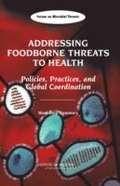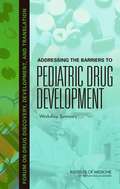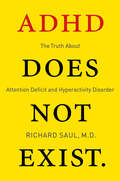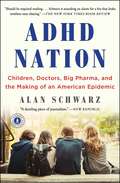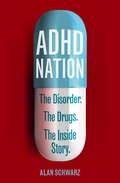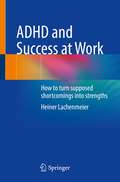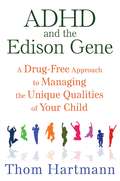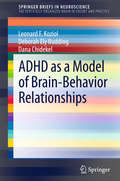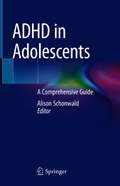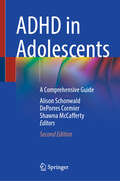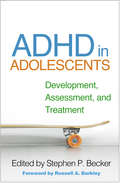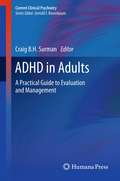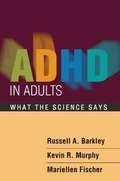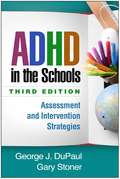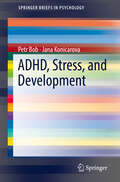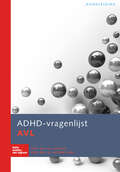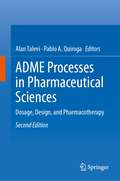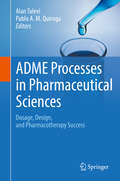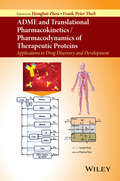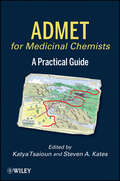- Table View
- List View
ACTivate Your Life: Using acceptance and mindfulness to build a life that is rich, fulfilling and fun
by Joe Oliver Jon Hill Eric MorrisACTivate Your Life focuses on helping people to be more open, connected and engaged with their lives, demonstrating how Acceptance Commitment Therapy can be used to tackle a range of problems such as low self-esteem, anxiety, anger and depression, as well as providing skills for life enhancement and self-development. Readers are encouraged to consider what matters to them and will learn techniques to set life directions based on meaningful values. Readers will also be introduced to mindfulness and learn how to use it in everyday life to connect with their actions, experiences and the people around them. The ACT approach also teaches that it's a normal part of being human to have thoughts and feelings that are unpleasant and the most important thing is to respond effectively when these kinds of experiences arise. The book is aimed at anyone wanting to enhance their life skills, and character stories are used to demonstrate the spectrum of how they might be employed.
ADA Quick Guide To Drug-supplement Interactions
by Alan P. AginsQuickly find potential interactions for the most common drugs and supplements you see every day. For maximum convenience, the format allows you to search according to drug class or supplement. Sturdy construction allows you to use it again and again.
ADDRESSING FOODBORNE THREATS TO HEALTH: Policies, Practices, and Global Coordination
by Institute of Medicine of the National AcademiesThe National Academies Press (NAP)--publisher for the National Academies--publishes more than 200 books a year offering the most authoritative views, definitive information, and groundbreaking recommendations on a wide range of topics in science, engineering, and health. Our books are unique in that they are authored by the nation's leading experts in every scientific field.
ADDRESSING THE BARRIERS TO PEDIATRIC DRUG DEVELOPMENT: Workshop Summary
by Institute of Medicine of the National AcademiesDecades of research have demonstrated that children do not respond to medications in the same way as adults. Differences between children and adults in the overall response to medications are due to profound anatomical, physiological, and developmental differences. Although few would argue that children should receive medications that have not been adequately tested for safety and efficacy, the majority of drugs prescribed for children--50 to 75 percent--have not been tested in pediatric populations. Without adequate data from such testing, prescribing drugs appropriately becomes challenging for clinicians treating children, from infancy through adolescence. Addressing the Barriers to Pediatric Drug Development is the summary of a workshop, held in Washington, D.C. on June 13, 2006, that was organized to identify barriers to the development and testing of drugs for pediatric populations, as well as ways in which the system can be improved to facilitate better treatments for children.
ADHD Does not Exist
by Richard SaulA radical new response to a widely misunderstood conditionWe are witnessing a global epidemic of attention deficit and hyperactivity disorder. Millions are suffering from attention issues, while millions more are reliant on stimulant medication to perform at school and at work. Despite decades of advancements in neuroscience, the definition of ADHD has remained essentially unchanged since its introduction in 1980, and its prevalence in the population has skyrocketed.In this controversial and landmark work, Dr. Richard Saul draws from five decades as a practicing physician and researcher in the field to contend that the definition of ADHD as we know it is completely wrong. Instead, he argues that the "disorder" is a cluster of symptoms stemming from more than twenty other conditions, each requiring separate treatment. The detailed list ranges from mild problems like poor eyesight, sleep deprivation, and even boredom in the classroom, to more severe conditions like depression and bipolar disorder.Through the lens of history and into the present day, Dr. Saul examines "ADHD," exploring the rising cultural and medical trends that have birthed the stimulant epidemic. Both comprehensive and illuminative, ADHD Does Not Exist is essential reading for doctors, practitioners, educators, and individuals who are seeking an honest approach to understanding and treating this complex condition.
ADHD Nation: Children, Doctors, Big Pharma, and the Making of an American Epidemic
by Alan SchwarzThe groundbreaking and definitive account of the widespread misdiagnosis of attention deficit hyperactivity disorder--and how its unchecked growth over half a century has made ADHD one of the most controversial conditions in medicine, with serious effects on children, adults, and society.More than 1 in 7 American children get diagnosed with ADHD--three times what experts have said is appropriate--meaning that millions of kids are misdiagnosed and taking medications such as Adderall or Concerta for a psychiatric condition they probably do not have. The numbers rise every year. And still, many experts and drug companies deny any cause for concern. In fact, they say that adults and the rest of the world should embrace ADHD and that its medications will transform their lives. In ADHD Nation, Alan Schwarz examines the roots and the rise of this cultural and medical phenomenon: The father of ADHD, Dr. Keith Conners, spends fifty years advocating drugs like Ritalin before realizing his role in what he now calls "a national disaster of dangerous proportions"; a troubled young girl and a studious teenage boy get entangled in the growing ADHD machine and take medications that backfire horribly; and big Pharma egregiously over-promotes the disorder and earns billions from the mishandling of children (and now adults). While demonstrating that ADHD is real and can be medicated when appropriate, Schwarz sounds a long-overdue alarm and urges America to address this growing national health crisis.
ADHD Nation: The disorder. The drugs. The inside story.
by Alan SchwarzAttention Deficit Hyperactivity Disorder (ADHD) will soon be the most frequently diagnosed chronic condition among children, surpassing asthma. Yet research shows that ADHD can't be that prevalent. ADHD, a problem once thought to affect a small percentage of children, has exploded into one of the most misdiagnosed psychiatric conditions. Now doctors and Big Pharma are targeting children and adults worldwide to get the diagnosis and take medications that will, they say, transform their lives. In ADHD Nation, acclaimed New York Times journalist Alan Schwarz takes readers behind the scenes to tell the full story of this billion-dollar industry. There's the father of ADHD, Dr Keith Conners, who spent fifty years promoting the disorder in the US and pills like Ritalin before realising just what he had wrought; a troubled young girl and studious, teenage boy who get entangled in the ADHD machine and are prescribed medications that lead to serious problems; and the pharmaceutical industry that promoted the disorder and continues to earn billions from the rampant mishandling of ADHD. An investigation of how Big Pharma and medical professionals are complicit in the creation, maintenance and continuing expansion of the ADHD industry, this book sounds the alarm for UK readers and demands we wake up to the problem that we too could face in the future.
ADHD and Success at Work: How to turn supposed shortcomings into strengths
by Heiner LachenmeierThis book explains, in engaging language, the emotional experience and possible behavioural patterns of ADHD on the bases of its neurobiological function, with a focus on the opportunities and obstacles faced by those with ADHD in professional education as well as in the course of a professional career. A number of conceptualization concerning the central traits of ADHD such as negative hyperfocus, unusual learning curve, questions of selfesteem and emergency-benefits are unfolded for the first time in detail, combined with actionable explanations on how to deal successfully with these traits. In consideration of readers with ADHD, the text is carefully written in a way that grabs your attention with: short sections, numerous illustrations, mini case histories and additional facts as extras. The book is meant for persons with ADHD and their families, for employers and HR responsibles and last but not least for physicians, psychiatrists, psychologists, social workers and other professionals who want to understand in depth the functioning and emotional experiencing of ADHD and how to deal with it in practice.
ADHD and the Edison Gene: A Drug-Free Approach to Managing the Unique Qualities of Your Child
by Thom HartmannExplores how the ADHD gene is and has been critical to humanity’s development • Shows how artists, inventors, and innovators carry the gene necessary for the future survival of humanity • Explains why children with this gene are so often mislabeled in public schools as having a disorder • Offers concrete strategies for helping children reach their full potential In ADHD and the Edison Gene, Thom Hartmann shows that the creativity, impulsiveness, risk taking, distractibility, and novelty seeking that are characteristic of Attention Deficit Hyperactivity Disorder (ADHD) are not signs of a disorder at all but instead are components of a highly adaptive skill set utilized by our hunting and gathering ancestors. These characteristics have been critical to the survival and development of our modern civilization and will be vital as humanity faces new challenges in the future. Hartmann, creator of the “hunter versus farmer” theory of ADHD, examines the differences in neurology between people with ADHD and those without, sharing recent discoveries that confirm the existence of an ADHD gene and the global catastrophe 40,000 years ago that triggered its development. He cites examples of significant innovators with ADHD traits, such as Ben Franklin and Thomas Edison, and argues that the children who possess the ADHD gene have neurology that is wired to give them brilliant success as artists, innovators, inventors, explorers, and entrepreneurs. Emphasizing the role that parents and teachers can play in harnessing the advantages of ADHD, he shares the story of how Edison was expelled from school for ADHD-related behavior and luckily his mother understood how to salvage his self-esteem and prepare him for a lifetime of success. Offering concrete strategies for nurturing, educating, and helping these children reach their full potential, Hartmann shows that rather than being “problems” such children are a vital gift to our society and the world.
ADHD as a Model of Brain-Behavior Relationships (SpringerBriefs in Neuroscience)
by Leonard F. Koziol Deborah Ely Budding Dana ChidekelADHD as a Model of Brain-Behavior Relationships Leonard F. Koziol, Deborah Ely Budding, and Dana Chidekel Series Title: Springer Briefs in Neuroscience Subseries: The Vertically Organized Brain in Theory and Practice It's been a basic neurological given: the brain does our thinking, and has evolved to do the thinking, as controlled by the neocortex. In this schema, all dysfunction can be traced to problems in the brain's lateral interactions. But in scientific reality, is this really true? Challenging this traditional cortico-centric view is a body of research emphasizing the role of the structures that control movement-the brain's vertical organization-in behavioral symptoms. Using a well-known, widely studied disorder as a test case, ADHD as a Model of Brain-Behavior Relationships offers an innovative framework for integrating neuroscience and behavioral research to refine diagnostic process and advance the understanding of disorders. Identifying a profound disconnect between current neuropsychological testing and the way the brain actually functions, this revision of the paradigm critiques the DSM and ICD in terms of the connectedness of brain structures regarding cognition and behavior. The authors argue for a large-scale brain network approach to pathology instead of the localizing that is so common historically, and for an alternate set of diagnostic criteria proposed by the NIMH. Included in the coverage: The diagnosis of ADHD: history and context. ADHD and neuropsychological nomenclature Research Domain Criteria: a dimensional approach to evaluating disorder The development of motor skills, executive function, and a relation to ADHD The role of the cerebellum in cognition, emotion, motivation, and dysfunction How large-scale brain networks interact Heralding a more accurate future of assessment, diagnosis, and treatment of neurodevelopmental disorders, ADHD as a Model of Brain-Behavior Relationships represents a major step forward for neuropsychologists, child psychologists, and psychiatrists, or any related profession interested in a neuroscientific understanding of brain function.
ADHD in Adolescents: A Comprehensive Guide
by Alison SchonwaldFinally, everything about ADHD in adolescents is in one place. This book is for you: a clinician diagnosing and treating teens with ADHD, a teacher educating teens with ADHD, or a parent raising one. Written for all readers, this resource is both comprehensive and straightforward, with quick tips and concise guidance in each chapter. Each of the four sections explores an essential aspect of ADHD in adolescents, starting first with detailed yet accessible best-practices of diagnosis and treatment. The second section takes a deep dive into the many disorders that mimic and co-occur with ADHD, including the most up to date information about electronics use and substance use. Section three unpacks the critical topic of Race, Culture, and Ethnicity in ADHD, and the hard-to-find topic of Relationships, Sexuality, and Sexual Behavior in Adolescents with ADHD. The closing and must-read chapters include practical guidance for parenting, thriving in high school, and planning the next steps for success. Across all four sections, clinical scenarios mirror common dilemmas faced by parents and teachers, and recurrent challenges familiar to clinicians. Information and resources direct the reader to best practices in ADHD in adolescents, with useful strategies usable for everyone.Written by experts in the field, ADHD in Adolescents is a valuable guide for all clinicians caring for teens with ADHD: pediatricians, child and adolescent neurologists, child and adolescent psychiatrists, adolescent medicine specialists, psychologists, nurse practitioners, physician assistants, social workers, and licensed clinical mental health workers. Parents and teachers of adolescents with ADHD will find this resource indispensable.
ADHD in Adolescents: A Comprehensive Guide
by Alison Schonwald DePorres Cormier Shawna McCaffertyEverything about ADHD in adolescents is here in one place. This book is for you: a clinician diagnosing and treating teens with ADHD, a teacher educating teens with ADHD, or a parent raising one. Written for all readers, this resource is both comprehensive and straightforward, with quick tips and concise guidance in each chapter. Now in its fully revised and expanded second edition, this text includes three distinct sections that explore essential aspects of ADHD in adolescents. The first section provides detailed yet accessible best-practices of diagnosis and treatment. The second section takes a deep dive into the many disorders that mimic and co-occur with ADHD. The final and third section focuses on critical topics related to adolescent ADHD: the all new chapter on Girls and ADHD, along with the hard to find chapters on Race, Culture, and Ethnicity in ADHD, as well as Relationships, Sexuality, and Sexual Behavior in Adolescents with ADHD. Across all three sections, clinical scenarios mirror common dilemmas faced by parents and teachers, and recurrent challenges familiar to clinicians. Information and resources direct the reader to best practices in ADHD in adolescents, with useful strategies usable for everyone. Written by experts in the field, ADHD in Adolescents, 2e is a valuable guide for all clinicians caring for teens with ADHD: pediatricians, child and adolescent neurologists, child and adolescent psychiatrists, adolescent medicine specialists, psychologists, nurse practitioners, physician assistants, social workers, and licensed clinical mental health workers. Parents and teachers of adolescents with ADHD will find this resource indispensable.
ADHD in Adolescents: Development, Assessment, and Treatment
by Stephen P. BeckerBringing together leading authorities, this much-needed volume synthesizes current knowledge about the nature, impact, and treatment of attention-deficit/hyperactivity disorder (ADHD) in the crucial developmental period of adolescence. Contributors explore the distinct challenges facing teens with ADHD as they navigate intensifying academic demands; new risks in the areas of driving, substance use, and romantic relationships; and co-occurring mental health problems. Best practices in clinical assessment are presented. Chapters on treatment--several of which include illustrative case examples--review interventions targeting motivation, executive functioning, and homework problems, as well as applications of cognitive-behavioral therapy and mindfulness. The book also examines medication issues specific to this age group.
ADHD in Adults: A Practical Guide to Evaluation and Management (Current Clinical Psychiatry #0)
by Craig B.H. SurmanADHD in Adults: A Practical Guide to Evaluation and Management is the product of a unique collaboration of international specialists. This volume offers easy-to-read guidance, and includes checklists, rating scales and treatment planning tools. It was designed for a broad audience of caregivers working in diverse settings, including psychiatrists, social workers, primary care physicians, nurse specialists and psychologists. The authors are highly acclaimed clinicians, investigators and educators. They offer step-by-step guidance for implementation of best practices, drawing from clinical research and their experience treating thousands of patients. They cover diagnosis, treatment planning, and state-of-the-art application of pharmacology, psychotherapy, skill-building, family system and environmental interventions - for both simple and complex cases. The scales and worksheets in this Guide were developed to efficiently facilitate assessment and management. The Editor is an international leader in the field from the Clinical and Research Program in Adult ADHD at Massachusetts General Hospital (MGH) and Harvard Medical School, which has made pioneering and highly cited contributions to the understanding of ADHD. This Guide is a definitive, indispensable resource for all health providers who wish to optimize their approach to adult patients with ADHD.
ADHD in Adults: What the Science Says
by Kevin Murphy Russell BarkleyProviding a new perspective on ADHD in adults, this compelling book analyzes findings from two major studies directed by leading authority Russell A. Barkley. Groundbreaking information is presented on the significant impairments produced by the disorder across major functional domains and life activities, including educational outcomes, work, relationships, health behaviors, and mental health. Thoughtfully considering the treatment implications of these findings, the book also demonstrates that existing diagnostic criteria do not accurately reflect the way ADHD is experienced by adults, and points the way toward developing better criteria that center on executive function deficits. Accessible tables, figures, and sidebars encapsulate the study results and methods.
ADHD in the Schools, Third Edition
by Robert Reid George J. Dupaul Gary StonerThis highly regarded practitioner guide provides state-of-the-art tools for supporting the academic and behavioral success of K-12 students with attention-deficit/hyperactivity disorder (ADHD). The authors explain the learning and behavior difficulties associated with ADHD and describe screening and assessment procedures that facilitate data-based decision making. They show how to develop individualized intervention plans that integrate behavioral, academic, and social supports, in partnership with teachers and parents. Strategies for collaborating with physicians and monitoring students' medication response are also presented. Helpful reproducible forms and handouts can be downloaded and printed in a convenient 8 1/2" x 11" size. New to This Edition: *Reflects a decade's worth of research and clinical advances, plus the growth of multi-tiered service delivery models. *Discusses changes in DSM-5. *Separate chapter on interventions for middle and high school students, with new content on the transition to college. *Updated medication information, case examples, and more.
ADHD in the Schools, Third Edition: Assessment and Intervention Strategies
by Robert Reid George J. Dupaul Gary StonerThis highly regarded practitioner guide provides state-of-the-art tools for supporting the academic and behavioral success of PreK-12 students with attention-deficit/hyperactivity disorder (ADHD). The authors explain the learning and behavior difficulties associated with ADHD and describe screening and assessment procedures that facilitate data-based decision making. They show how to develop individualized intervention plans that integrate behavioral, academic, and social supports, in partnership with teachers and parents. Strategies for collaborating with physicians and monitoring students' medication response are also presented. Helpful reproducible forms and handouts can be downloaded and printed in a convenient 8 1/2" x 11" size. New to This Edition: *Reflects a decade's worth of research and clinical advances, plus the growth of multi-tiered service delivery models. *Discusses changes in DSM-5. *Separate chapter on interventions for middle and high school students, with new content on the transition to college. *Updated medication information, case examples, and more.
ADHD, Stress, and Development (SpringerBriefs in Psychology)
by Petr Bob Jana KonicarovaThis first-of-its-kind volume revisits current findings on ADHD in terms of classic thinking on developmental neuropsychology for a more rounded concept of brain disorganization. Insights from Freud, Janet, John Hughlings Jackson, and other pioneers help identify mechanisms (e.g., the primitive reflexes) that can cause children with ADHD to be prone to cognitive dissociation when exposed to stressful environments. The authors’ model of the developing distracted brain pinpoints effects of stress on cognitive and affective functions, most notably attention and memory, and suggests situations in which stimuli may facilitate integration between brain and mind. This expanded knowledge opens out new educational possibilities for vulnerable students as well as new opportunities for therapeutic breakthroughs for children with ADHD. Included in the coverage: · Definition, diagnosis, and epidemiology of Attention Deficit and Hyperactivity Disorder. · Historical and recent research on ADHD. · Attentional functions, executive dysfunctions, and stress, implications for ADHD. · Neural dissolution, dissociation, and stress in ADHD. · Attention, brain-mind integration and ADHD. · Implications for education and therapy of ADHD children. ADHD, Stress, and Development ably synthesizes past and current understanding into a robust framework with implications for real-world practice. It offers practitioners and researchers new perspectives and future directions in neuropsychology, psychiatry, child and school psychology, and pediatrics.
ADHD-vragenlijst AVL: Avl
by J.D. van der Ploeg E. M. ScholteDe ADHD vragenlijst (AVL) is ontwikkeld om bij kinderen in de leeftijd van 4 tot 18 jaar de (gedrags)symptomen van ADHD te kunnen bepalen. Daarbij verwijst ADHD naar de volgende drie basisvormen van probleemgedrag bij kinderen: a aandachtstekort (snel afgeleid en weinig taakgericht)b hyperactiviteit (overbeweeglijkheid en motorische onrust)c impulsiviteit (ongecontroleerd en ongeremd gedrag).De AVL is een vragenlijst met totaal 18 vragen op bovengenoemde gebieden. Het invullen neemt max. 15 minuten in beslag. De AVL is bruikbaar in diverse speciale zorgsituaties voor kinderen, zoals de ambulante en residentiele jeugdzorg, de daghulp, de pleegzorg en het (speciaal)onderwijs. Daarbij kan hij ook worden gebruikt om de effecten van de behandeling van ADHD te evalueren.De AVL voldoet ruimschoots aan de kwaliteitseisen van de COTAN en staat op de lijst van aanbevolen tests voor indicatiestelling voor het speciaal onderwijs.
ADHS: Ressourcen und Stressbewältigung für betroffene Erwachsene und Jugendliche
by Astrid Schütz Tina HorlitzSelbsthilfe bei ADHS/ADS: zu wenig Aufmerksamkeit und Konzentration Wer unter dem Aufmerksamkeitsdefizitsyndrom leidet, erlebt Stress im Beruf, kann sich auch im Privaten nicht konzentrieren, braucht einen Plan, hält ihn nicht ein. . . Während bei Kindern die Diagnostik standardmäßig beachtet wird, gibt es zahlreiche Erwachsene, die die Ursachen ihrer Beeinträchtigung nicht kennen. Sie haben dennoch gelernt, mit wechselnden Eindrücken umzugehen und Ziele mit Ausdauer zu verfolgen - oft ist der sog. Hyperfokus zu ihrer Ressource geworden. In diesem Buch erfahren Betroffene und Interessierte, was das Besondere an Jugendlichen und Erwachsenen mit AD(H)S ist und welche Belastung, aber auch welches Potential in ihrem Leben zwischen einem weiten Himmel und ihrem empfundenen Druck stecken können. Hilfreich für Betroffene von 18 bis 100 Jahren Im ersten Teil des Buches wird anhand eines fiktiven Gesprächs zwischen Anny (einer Betroffenen) und einem Psychologen dargestellt, welche typischen Fragen Betroffene stellen, was sie von sich erzählen können und welche Hilfsmöglichkeiten bestehen. Dieser Teil des Buches ist abwechslungsreich geschrieben und leicht lesbar. Im zweiten Teil werden Ressourcen greifbar: praktische Selbsthilfeübungen und Arbeitsblätter, Reflexionsfragen und Strategien zur Bewältigung von Stresserleben bei AD(H)S. Alle Arbeitsblätter finden Sie zusätzlich kostenlos zum Download im Internet. Die Übungen sind leicht umsetzbar. Geschrieben für Erwachsene und Jugendliche mit ADHS, ihre Angehörigen und Freunde
ADME Processes in Pharmaceutical Sciences: Dosage, Design, and Pharmacotherapy
by Alan Talevi Pablo A. QuirogaAbsorption, Distribution, Metabolism and Excretion (ADME) processes and their relationship with the design of dosage forms and the success of pharmacotherapy form the basis of this upper level undergraduate/graduate textbook. Whereas primarily oriented to Pharmacy students and graduates, it can also be useful for scientist from different fields elated to pharmaceutics and pharmacology. (e.g., material scientists, material engineers, medicinal chemists, physicians) who might be working in a positions in pharmaceutical companies or whose work might benefit from basic training in the ADME concepts and related biological background.Pedagogical features such as objectives, keywords, discussion questions, summaries and case studies are included as teaching tools. This book will provide not only general knowledge on ADME processes but also an updated insight on some hot topics such as drug transporters, multi-drug resistance related to pharmacokinetic phenomena, last generation pharmaceutical carriers (nanopharmaceuticals), in vitro and in vivo bioequivalence studies, biopharmaceuticals, pharmacogenomics, drug-drug and food-drug interactions, in silico and in vitro prediction of ADME properties, or chronopharmacokinetic. In comparison with other similar textbooks, around half of the volume would be focused on the relationship between expanding scientific fields and ADME processes. Each of these burgeoning fields has a separate chapter in the second part of the volume, and is written with experts on the correspondent topic, including industrial scientists and academics from USA and UK.Additionally, each of the initial chapters dealing with the generalities of drug absorption, distribution, metabolism and excretion would include relevant, classic examples related to each topic with appropriate illustrations. ADME Processes and Pharmaceutical Sciences is written as a core textbook for courses on pharmaceutical sciences: pharmacology, pharmacokinetics,drug delivery, biopharmaceutics, drug design and medicinal chemistry courses.
ADME Processes in Pharmaceutical Sciences: Dosage, Design, and Pharmacotherapy Success
by Alan Talevi Pablo A. QuirogaAbsorption, Distribution, Metabolism and Excretion (ADME) processes and their relationship with the design of dosage forms and the success of pharmacotherapy form the basis of this upper level undergraduate/graduate textbook. As an introduction oriented to pharmacy students, it is also written for scientist from different fields outside of pharmaceutics. (e.g. material scientist, material engineers, medicinal chemists) who might be working in a positions in pharmaceutical companies or whose work might benefit from basic training in the ADME concepts and some biological background. Pedagogical features such as objectives, keywords, discussion questions, summaries and case studies add valuable teaching tools. This book will provide not only general knowledge on ADME processes but also an updated insight on some hot topics such as drug transporters, multi-drug resistance related to pharmacokinetic phenomena, last generation pharmaceutical carriers (nanopharmaceuticals), in vitro and in vivo bioequivalence studies, biopharmaceuticals, pharmacogenomics, drug-drug and food-drug interactions, and in silico and in vitro prediction of ADME properties. In comparison with other similar textbooks, around half of the volume would be focused on the relationship between expanding scientific fields and ADME processes. Each of these burgeoning fields has a separate chapter in the second part of the volume, and was written with leading experts on the correspondent topic, including scientists and academics from USA and UK (Duquesne University School of Pharmacy, Indiana University School of Medicine, University of Utah College of Pharmacy, University of Maryland, University of Bath).Additionally, each of the initial chapters dealing with the generalities of drug absorption, distribution, metabolism and excretion would include relevant, classic examples related to each topic with appropriate illustrations (e.g. importance of active absorption of levodopa, implications in levodopa administration, drug drug interactions and food drug interactions emerging from the active uptake; intoxication with paracetamol as a result of glutathione depletion, CYP induction and its relationship with acute liver failure caused by paracetamol, etc).ADME Processes and Pharmaceutical Sciences is written as a core textbook for ADME processes, pharmacy, pharmacokinetics, drug delivery, biopharmaceutics, drug disposition, drug design and medicinal chemistry courses.
ADME and Translational Pharmacokinetics / Pharmacodynamics of Therapeutic Proteins: Applications in Drug Discovery and Development
by Honghui Zhou Frank-Peter TheilWith an emphasis on the fundamental and practical aspects of ADME for therapeutic proteins, this book helps readers strategize, plan and implement translational research for biologic drugs. • Details cutting-edge ADME (absorption, distribution, metabolism and excretion) and PKPD (pharmacokinetic / pharmacodynamics) modeling for biologic drugs• Combines theoretical with practical aspects of ADME in biologic drug discovery and development and compares innovator biologics with biosimilar biologics and small molecules with biologics, giving a lessons-learned perspective • Includes case studies about leveraging ADME to improve biologics drug development for monoclonal antibodies, fusion proteins, pegylated proteins, ADCs, bispecifics, and vaccines• Presents regulatory expectations and industry perspectives for developing biologic drugs in USA, EU, and Japan• Provides mechanistic insight into biodistribution and target-driven pharmacokinetics in important sites of action such as tumors and the brain
ADMET for Medicinal Chemists
by Steven A. Kates Katya TsaiounThis book guides medicinal chemists in how to implement early ADMET testing in their workflow in order to improve both the speed and efficiency of their efforts. Although many pharmaceutical companies have dedicated groups directly interfacing with drug discovery, the scientific principles and strategies are practiced in a variety of different ways. This book answers the need to regularize the drug discovery interface; it defines and reviews the field of ADME for medicinal chemists. In addition, the scientific principles and the tools utilized by ADME scientists in a discovery setting, as applied to medicinal chemistry and structure modification to improve drug-like properties of drug candidates, are examined.
AE-Manual der Endoprothetik: Ellenbogen
by Wolfgang Rüther Beat R. SimmenDer Band zur Endoprothetik des Ellenbogens ist der vorläufig letzte Teil des Gesamtwerkes Manual der Endoprothetik, herausgegeben von der Arbeitsgemeinschaft Endoprothetik Der prothetische Ersatz des Ellenbogengelenkes ist der am seltensten durchgeführte Gelenkersatz der großen Gelenke an oberen und unteren Extremitäten. Die funktionellen Kompensationsmöglichkeiten der Patienten, der weniger weit fortgeschrittene Entwicklungsstand der Ellenbogenprothetik im Vergleich zur Hüft- und Kniearthroplastik, die technischen Probleme bei der Operation selbst mit höherer Komplikationsrate und den äußerst anspruchsvollen Rückzugsmöglichkeiten beim Versagen sind die Ursachen. Dies gilt für alle bisher vorgestellten Designvariationen der Ellenbogenkunstgelenke. Gründe für das frühere und häufigere Versagen liegen in der besonderen Anatomie und Biomechanik des Ellenbogengelenkes und den damit verbundenen Konsequenzen für die Leistungsfähigkeit eines Kunstgelenkes. Auf diese Probleme wird in diesem Band eingegangen. Indikationsstellung, Operationstechnik, alternative Verfahren, frühe und späte Komplikationen, deren Behandlung, und Rückzugsmöglichkeiten werden dargelegt. Mittel- und längerfristige Ergebnisse werden diskutiert. Die beschränkten ossären Reserven des Ellenbogenknochenlagers, die Klippen und Tücken der Ellenbogenarthroplastik werden ersichtlich und mögen sowohl Anleitung sein als auch die Möglichkeiten und ihre Grenzen aufzeigen. Empfehlungen zur postoperativen Nachbehandlung und Rehabilitation ergänzen den Band Nationale und internationale Erfahrungen sind zu dieser Standortbestimmung zusammengeführt.


